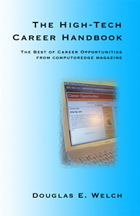Notation and
Recall
February 4, 2005
** Listen to this column
on your computer, iPod or other audio player **
Listen
| Listen
(Backup)
There are many “secrets” to a successful high-tech career,
but most of them are simple procedures, habits, hints or, more likely,
common sense ways of working more effectively. Over the years of my high-tech
career (now 20 years and counting) I have found one particular “secret”
to be invaluable. The need to remember information and recall it at will
goes far beyond the usual recalling of addresses, phone numbers and directions.
You need to be able to recall everything from simple procedures to complex
processes for thousands of different computers, routers, PDA’s,
printers and more. The real secret, though, is not how to store this all
in your head, but how to develop systems that allow you to find the information
each time you need it.
Online Brain
I saw this term coined a few months ago by an online user. They described
their combination of notation and recall aids in this way to differentiate
it from all the “stuff” they held in their own heads on a
daily basis. While I may not have applied the same term to it, I have
certainly been using the concept for years.
My main notation device is decidedly low-tech. It is a simple, 8.5x11,
hardcover journal purchased at Borders whenever they are on sale. I keep
a stack in my closet so I can start a new one whenever needed. To maximize
the pages, I use the journal in both directions. Opening the book one
way, it is my daily log of on-site calls, telephone calls and whatever
pieces of information I need to store. Flip it over, and it is a notebook
where pages are dedicated to specific topics like ideas for this column,
consulting promotion, music, books to request from the library, etc. I
find it easier to handwrite these types of items than typing them into
my PDA, but it matters little how you store the info, only that you store
it.
Many items from this journal, including expiration dates for client’s
anti-virus programs, router addresses, computer type/speed/memory/hard
drive information, get entered into my computerized date book for later
follow-up. I use Now Up-To-Date and Now Contact (http://www.poweronsoftware.com)
as my main to-do list and calendar manager. It allows me to share my calendar
with my wife, allowing us to coordinate our complicated schedules, as
well as that of our school-age son. One major use for this calendar is
as a “tickler file.” Instead of trying to remember every appointment
and every time-sensitive commitment, my calendar reminds me on the proper
day to begin addressing this issue or that. Since this information easily
syncs with my Handspring Treo, I can carry this information wherever I
go.
The next major part of my online brain are search engines. Google (http://www.google.com)
is, by far, my favorite source for locating information. Whenever I am
confronted with a new problem, or need to remember a solution from the
past, this is the first place I turn. Google allows me to search large
swaths of information at a single click, including web sites and Usenet
newsgroups. It is a rare problem that doesn’t appear somewhere in
Google’s index. In some cases, I have found information using Google
that the manufacturers own search engine didn’t turn up, even though
it was obviously in their own support database.
My weblog, My Word, also acts as a more specific repository of information.
I will often share information on specific fixes or issues with my readers.
This then automatically becomes part of my online brain. Much like my
handwritten journal, once information is entered there I can easily find
it again. Also, using Google’s SiteSearch option, I can limit searches
to just my own personal web site, leading me right to the information
I need without digging through the entire Internet.
Finally, an online bookmark site such as Delicious (http://del.icio.us/)
allows me to quickly stash away bookmarks that are then available wherever
and whenever I have an Internet connection. I can easily refer to these
bookmarks or share them with others. This also allows me to actively watch
what other users are posting in various topic areas so I can stay current
on emerging trends and problems.
If you want to increase your effectiveness in your high-tech career, improving
your notation and recall skills is certainly a great place to start. Remember,
it isn’t who you know or even what you know, but how quickly you
can look something up that really matters. If you are able to put your
finger on the right information at the right time, you are well on the
way to a successful high-tech career.
|

Now
Available from CafePress.com
<%=INSERTTEXT%>
|